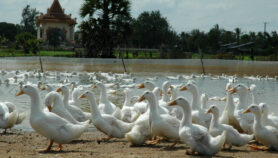By: Lei Du
Send to a friend
The details you provide on this page will not be used to send unsolicited email, and will not be sold to a 3rd party. See privacy policy.
Researchers say that a warmer, wetter climate in Central Asia could increase the risk of plague, the disease that claimed about 75 million lives in Asia, Europe, and the Middle East in the fourteenth century.
Lead researcher Nils Stenseth of the University of Oslo, Norway says, however, that while global warming could lead to more human cases in Central Asia, it will not lead to a major epidemic.
The findings will be published online this week by Proceedings of the National Academy of Sciences.
Plague is caused by Yersinia pestis, a bacterium that primarily infects fleas, which then transmit the bacterium to rodents.
People can get infected if an infected flea bites them or if they come into close contact with infected animals.
Stenseth’s team analysed data collected in Kazakhstan between 1949 and 1995. This included information on climate, the abundance of rodents called great gerbils and the number of gerbils infected by Yersinia pestis.
"There is a clear link between the occurrence of plague bacterium in great gerbils and climate", says Stenseth.
The study suggests that more rain in summer could lead to more plague in autumn, and that a one degree Celsius increase in springtime temperature could increase the prevalence of plague in great gerbils by up to 59 per cent.
Scientists have predicted that the global average temperature will rise by 1-2 degrees centigrade by 2050.
Stenseth’s team’s findings support suggestions that previous plague epidemics — the Black Death of the 14th century and a 19th-century epidemic in Asia — were linked to climate. Both occurred during periods that were warmer and wetter than normal.
Today, plague is rare. It affects a few thousand people in Asia, parts of Africa, South America and the United States each year.
"The greatest significance of the study is the long-term nature of the data, which is unique in the world," says plague researcher Michael Antolin of Colorado State University, United States, who was not involved in the study.
Antolin says that warming alone is unlikely to increase the risk of plague outbreaks, because the bacterium cannot tolerate excessively warm or dry conditions.
He also points out that fewer people come into close contact with rodents and fleas these days.
Stenseth told SciDev.Net: "We have to remember that plague can’t be eradicated as its main host is a wildlife species, which cannot be eradicated".
Reference doi/10.1073/pnas.0602447103













